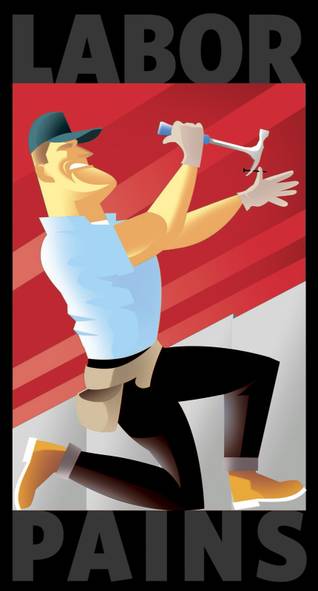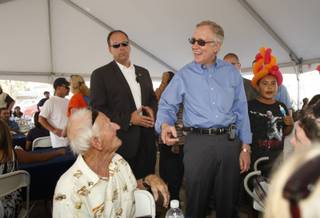Sunday, Sept. 6, 2009 | 2 a.m.
Sun Coverage
Thousands of union construction workers gathered on a vacant, dirt lot in downtown Las Vegas last week to hear some of Southern Nevada’s most prominent Democratic leaders fete their accomplishments.
The event, dubbed a “Celebration of Nevada Workers,” was part political rally, part carnival — complete with hot dogs, shaved ice cones and amusement rides. But the high praise and free food were cold comfort for Las Vegas workers facing the worst Labor Day in state history.
Nevada ranks third in the nation in unemployment, with Clark County feeling the bulk of the pain. The jobless rate here is more than 13 percent. Two decades of explosive growth have slammed to a halt and the region is reeling.
According to the most recent estimates, the county lost 10,000 residents from July 2007 to July 2008. And if Florida, with its growth-dependent economy, is any indication, that figure will balloon. The Sunshine State shed 50,000 people over the past year.
The consensus among workers is clear: Las Vegas, as they put it, is “boomed out.”
Labor leaders are coping with the grim reality that Las Vegas — at least for the foreseeable future — is a much smaller place, its identity as a workers’ paradise diminished, if not destroyed.
“These are pretty trying times for anybody working for a living,” said Danny Thompson, executive-secretary treasurer of the Nevada AFL-CIO. “And it’s going to get worse.”
Steve Ross, head of the Southern Nevada Building and Construction Trades Council, acknowledged the slowing economy has caught workers off guard.
“Las Vegas is not like other cities. The boom has gone on so long, for so many years, that we’ve gotten very used to that,” he said. “We have been spoiled here.”
More than 25 percent of the region’s union construction workers are unemployed, Thompson said. Today, half of Reno construction workers are jobless, a mark he predicts Las Vegas will hit by year’s end.
Employment in Southern Nevada’s construction industry has dropped nearly 40 percent, from a high of 125,000 jobs in 2006 to 76,000 today. MGM Mirage’s CityCenter remains the sole bright spot on the Strip, as work on other megaresort projects has slowed or stopped.
The state’s leisure and hospitality industry has also taken a hit, shedding 22,700 jobs over the past year. Casino operators, burdened by heavy debt taken on in the boom years, have cuts costs by thinning their workforces.
To be sure, public works projects funded by the federal stimulus package and the potential for renewable energy development provide a glimmer of hope. But those jobs have been slow to materialize.
“It’s a slippery slope for the rest of the year,” Thompson said. “There just aren’t the types of jobs on the books to create new employment.”
The desperate scramble for work can be seen in the surge of CityCenter applications. MGM Mirage has received more than 150,000 resumes — for an estimated 12,000 jobs. That’s the equivalent of roughly 84 percent of the state’s unemployment roll. The casino giant says that 75 percent of those applicants come from outside the company.
Construction workers, in particular, see a dim future here.
Jennifer Todd, an ironworker steward at CityCenter, is supporting a family of five on her salary. Her husband, James Brunty, was laid off at Fontainebleau in October and hasn’t been able to find work since — here or elsewhere. The couple bought a house last year and are struggling to pay the mortgage.
“People are losing their houses,” Todd said. “They can’t pay their bills. And if they’re lucky enough to have a job, there’s daily worry about layoffs.”
Brunty said the sharp downturn in the industry presents a challenge to construction workers, who are nomadic, traveling from boom to boom. “You used to be able to go anywhere when things stopped,” he said. “Now there’s no work and we’re stranded.”
The sting is sharp for longtime residents and native Nevadans.
Brian Gomez worked as a heavy equipment operator on the Hard Rock Hotel expansion and was laid off in May 2008. He hasn’t been able to find regular work since and moved his family into his parents’ house after his savings ran out. Sitting under a canopy at last week’s rally, Gomez seemed resigned. He and his family are considering moving.
“We all knew the work would stop at some point,” he said.
Then there’s the wounded pride of tradesmen such as Edwin Manning, a plasterer who has worked Las Vegas construction for the past 27 years. He was laid off last month from a job at Caesars Palace’s high roller suites.
“We built this town, and it became something,” he said. “Now the pioneers are out of work.”
On the service side, the Culinary Union saw its first decline in membership in two decades, losing roughly 5,000 members to layoffs. Because of hour reductions, some members fell below the minimum requirement to maintain health insurance. The union responded by offering a basic coverage plan that allowed workers to make up the difference.
“More than 85 percent of our folks are still working,” said Culinary Secretary-Treasurer D. Taylor. “But there’s no sugarcoating it. It’s been a tough year.”
A bright spot: The union used its new labor-management housing fund to help 75 members purchase their first homes.
Although Taylor is bullish on gaming, he offered a cautionary note on the extent of the recovery: “I think the entire country has a whole different perspective on spending. People are watching their nickels and dimes.”
Labor leaders say the recession has brought Nevada’s reliance on the gaming and construction industries into sharp relief. The state’s failure to diversify the economy has left workers vulnerable, and they intend to spend their resources over the next year reducing that vulnerability.
Mission one: diversifying the state’s tax base.
The Nevada AFL-CIO is considering putting the idea of a gross-receipts business tax to voters by sponsoring a ballot initiative.
“You have a very small group of people paying all the bills,” Thompson said. “Until you fix that you’re going to have a lousy educational system and lousy public services. Somebody has to stand up and say enough is enough.”
Sun reporter Cydney Cappello contributed to this story.



Join the Discussion:
Check this out for a full explanation of our conversion to the LiveFyre commenting system and instructions on how to sign up for an account.
Full comments policy